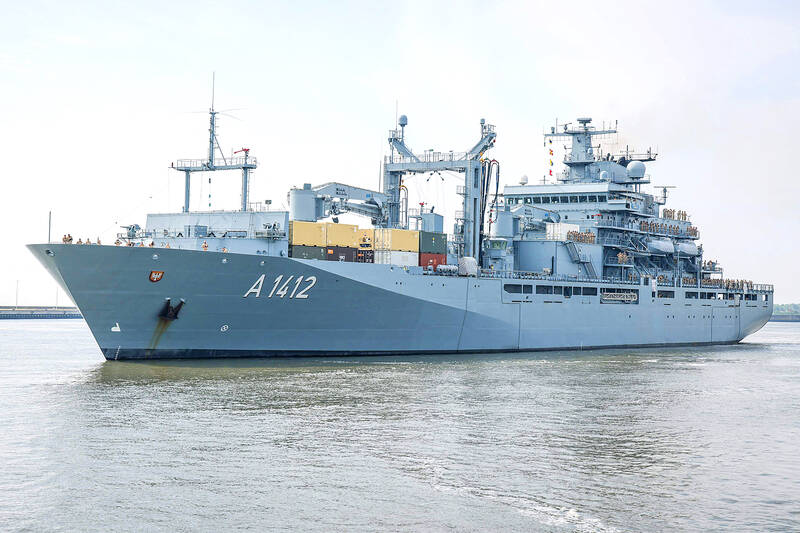The German supply ship Frankfurt am Main and frigate Baden-Wuerttemberg are on their way to Jakarta via the Taiwan Strait, German Minister of Defense Boris Pistorius said in Berlin yesterday.
It is the first such transit by a German warship in 22 years.
Pistorius confirmed the transit during a news conference he held jointly with Lithuanian Minister of Foreign Affairs Gabrielius Landsbergis, saying that the two naval vessels were approaching the Taiwan Strait.

Photo: AFP
“International waters are international waters” and the transit of the Strait complies with international laws, Pistorius said.
The transit is being made because the German vessels see it as the shortest and safest route under the weather conditions, the minister added.
The transit was first reported by the German weekly news magazine Der Spiegel on Saturday last week.
The Chinese Ministry of Foreign Affairs said such transits “provoke and endanger China’s sovereignty and security under the pretext of ‘freedom of navigation.’”
In Taipei, the Ministry of National Defense said its armed forces closely monitored activities in the air and water around Taiwan when the transit took place that morning.
A business group in Europe’s largest economy, the Federation of German Industries, welcomed the move.
“German industry is encouraging the federal government to maintain the already eroding rules-based international order as far as possible,” executive board member Wolfgang Niedermark told the Handelsblatt financial daily.
Rules are only valid if they are enforced consistently, and “Germany too must take responsibility for this,” he added.
EU countries have been increasing their presence in the Indo-Pacific region more broadly this year, Institute for National Defense and Security Research assistant analyst Hsu Chih-hsiang (許智翔) said.
“EU nations are unlikely to send vessels or troops if China invaded Taiwan, but they are still able to send warship in peacetime to show their concerns,” he said.
Germany mulled sending a frigate through the Taiwan Strait several years ago, but canceled the plan as then-German chancellor Angela Merkel did not want to irritate China, he added.
The US conducts regular transits through the Strait, and France, the UK and Canada have all sent vessels in recent years.
German Bundestag Foreign Affairs Committee Chair Michael Roth earlier this month defended his nation’s actions.
“A transit is not a provocation,” he wrote on X.
“We stand for peace and security in the Taiwan Strait and oppose any unilateral and violent changes to the status quo by China,” he added.

CHAOS: Iranians took to the streets playing celebratory music after reports of Khamenei’s death on Saturday, while mourners also gathered in Tehran yesterday Iranian Supreme Leader Ayatollah Ali Khamenei was killed in a major attack on Iran launched by Israel and the US, throwing the future of the Islamic republic into doubt and raising the risk of regional instability. Iranian state television and the state-run IRNA news agency announced the 86-year-old’s death early yesterday. US President Donald Trump said it gave Iranians their “greatest chance” to “take back” their country. The announcements came after a joint US and Israeli aerial bombardment that targeted Iranian military and governmental sites. Trump said the “heavy and pinpoint bombing” would continue through the week or as long

TRUST: The KMT said it respected the US’ timing and considerations, and hoped it would continue to honor its commitments to helping Taiwan bolster its defenses and deterrence US President Donald Trump is delaying a multibillion-dollar arms sale to Taiwan to ensure his visit to Beijing is successful, a New York Times report said. The weapons sales package has stalled in the US Department of State, the report said, citing US officials it did not identify. The White House has told agencies not to push forward ahead of Trump’s meeting with Chinese President Xi Jinping (習近平), it said. The two last month held a phone call to discuss trade and geopolitical flashpoints ahead of the summit. Xi raised the Taiwan issue and urged the US to handle arms sales to

BIG SPENDERS: Foreign investors bought the most Taiwan equities since 2005, signaling confidence that an AI boom would continue to benefit chipmakers Taiwan Semiconductor Manufacturing Co’s (TSMC, 台積電) market capitalization swelled to US$2 trillion for the first time following a 4.25 percent rally in its American depositary receipts (ADR) overnight, putting the world’s biggest contract chipmaker sixth on the list of the world’s biggest companies by market capitalization, just behind Amazon.com Inc. The site CompaniesMarketcap.com ranked TSMC ahead of Saudi Aramco and Meta Platforms Inc. The Taiwanese company’s ADRs on Tuesday surged to US$385.75 on the New York Stock Exchange, as strong demand for artificial intelligence (AI) applications led to chip supply constraints and boost revenue growth to record-breaking levels. Each TSMC ADR represents

Pro-democracy media tycoon Jimmy Lai’s (黎智英) fraud conviction and prison sentence were yesterday overturned by a Hong Kong court, in a surprise legal decision that comes soon after Lai was jailed for 20 years on a separate national security charge. Judges Jeremy Poon (潘兆初), Anthea Pang (彭寶琴) and Derek Pang (彭偉昌) said in the judgement that they allowed the appeal from Lai, and another defendant in the case, to proceed, as a lower court judge had “erred.” “The Court of Appeal gave them leave to appeal against their conviction, allowed their appeals, quashed the convictions and set aside the sentences,” the judges